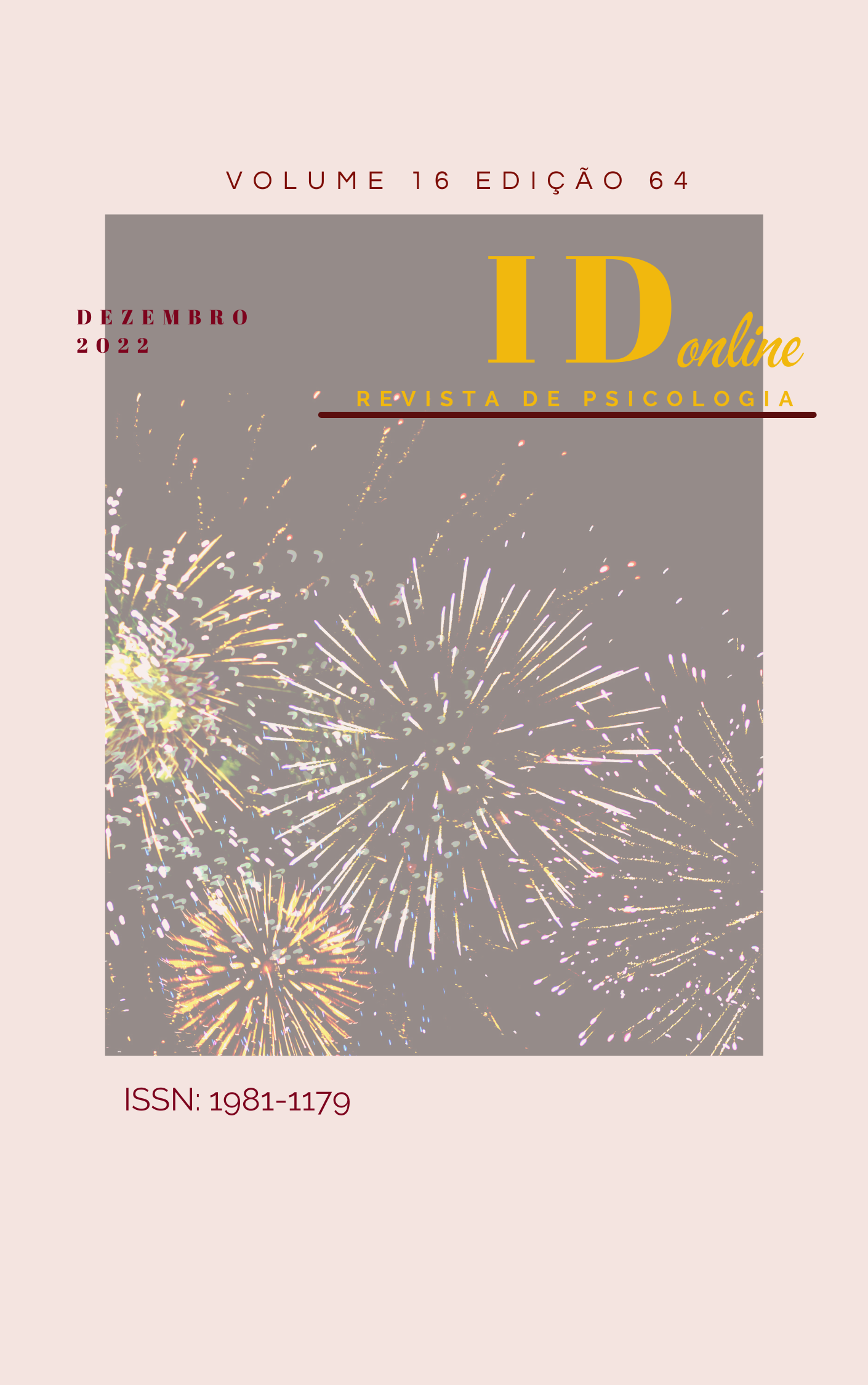Characterization of Bruxism and complications in the Covid-19 pandemic: A Literature Review
DOI:
https://doi.org/10.14295/idonline.v17i69.3874Keywords:
bruxism, covid-19, anxietyAbstract
Abstract: The research addresses bruxism and its characteristics associated with its development in the "pandemic period". In December 2019 there were reports of cases in China of a virus that would later spread to several countries, marking the beginning of a COVID-19 pandemic, its emergence triggering several risk factors for this occlusal parafunction. Objective: The worries, anxieties, stresses, crises, psychological effects that are found in the pandemic and associated with other etiologies have formed a favorable climate for triggering risk factors that influence the formation or worsening of bruxism. Methodology: The Pubmed, Scielo and Lilacs databases were used as a means of research, and 19 articles were chosen to serve as a scientific basis for proving the theme. Conclusion: It is important to diagnose and treat bruxism in order to avoid an increase in frequency (daytime, nighttime or both) or severity (mild, moderate or severe) and if necessary with multidisciplinary treatment.
Downloads
References
BEDDIS, H.; PEMBERTON, M.; DAVIES, S. Sleep bruxism: An overview for clinicians. British Dental Journal, v. 225, n. 6, p. 497–501, 28 set. 2018. DOI: https://doi.org/10.1038/sj.bdj.2018.757
BULANDA, S. et al. Sleep bruxism in children: Etiology, diagnosis and treatment—a literature review. International Journal of Environmental Research and Public Health MDPI, , 1 set. 2021. DOI: https://doi.org/10.3390/ijerph18189544
CARVALHO, M. F. DE; ALCÂNTARA, A. P. S. DE L. Utilização da toxina botulínica em desordens temporomandibulares: uma revisão sistemática / Use of botulinum toxin in temporomandibular disorders: a systematic review. Brazilian Journal of Health Review, v. 3, n. 6, p. 19160–19168, 2020. DOI: https://doi.org/10.34119/bjhrv3n6-300
CERVANTES-CHAVARRÍA, A. R.; UTSMAN ABARCA, R.; HERRERO BABILONI, A. Bruxism an Issue Between the Myths and Facts. Odovtos - International Journal of Dental Sciences, v. 24, n. 3, p. 15–21, 1 set. 2022. DOI: https://doi.org/10.15517/ijds.2022.50506
CHALCO VALDIVIA, A. V.; LÓPEZ FLORES, A. I. Consideraciones actuales sobre el uso de férulas oclusales en rehabilitación oral: una revisión crítica. Revista Científica Odontológica, v. 7, n. 1, p. 157–167, 30 jun. 2019. DOI: https://doi.org/10.21142/2523-2754-0701-2019-157-167
CIFUENTES-HARRIS, C. B. et al. Bruxismo: etiología, diagnóstico y sus repercusiones en adultos. Revisión de la literatura. Revista Odontología Sanmarquina, Odontol. Sanmarquina 2022.
DEMJAHA, G.; KAPUSEVSKA, B.; PEJKOVSKA-SHAHPASKA, B. Bruxism unconscious oral habit in everyday life. Open Access Macedonian Journal of Medical Sciences, v. 7, n. 5, p. 876–881, 15 mar. 2019. DOI: https://doi.org/10.3889/oamjms.2019.196
ELENA MENDIBURU-ZAVALA, C. et al. Niveles de Estrés y Bruxismo Durante la Pandemia COVID-19 en Estudiantes y Deportistas Universitarios Evaluados de Manera Virtual Levels of Stress and Bruxism During the Pandemic COVID-19 in University Students and Athletes Assessed VirtuallyInt. J. Odontostomat. [s.l: s.n.]. Disponível em: <https://forms.gle/q8NS9KLrXutxgsEJ9,>.
FERNÁNDEZ-NÚÑEZ, T.; AMGHAR-MAACH, S.; GAY-ESCODA, C. Efficacy of botulinum toxin in the treatment of bruxism: Systematic review. Medicina Oral Patologia Oral y Cirugia Bucal, v. 24, n. 4, p. e416–e424, 1 jul. 2019. DOI: https://doi.org/10.4317/medoral.22923
FLAUDIAS, V. et al. COVID-19 pandemic lockdown and problematic eating behaviors in a student population. Journal of Behavioral Addictions, v. 9, n. 3, p. 826–835, 1 set. 2020. DOI: https://doi.org/10.1556/2006.2020.00053
GENEROSO, L. P. et al. Impact of COVID-19 pandemic on psychological aspects and bruxism in the Brazilian population: observational study. Brazilian Journal Of Pain, v. 5, n. 1, 2022. DOI: https://doi.org/10.5935/2595-0118.20220009
GLOSTER, A. T. et al. Impact of COVID-19 pandemic on mental health: An international study. PLoS ONE, v. 15, n. 12 December, 1 dez. 2020.
KARDEŞ, E.; KARDEŞ, S. Google searches for bruxism, teeth grinding, and teeth clenching during the COVID-19 pandemic. Journal of Orofacial Orthopedics, v. 83, n. 6, p. 1–6, 1 nov. 2022. DOI: https://doi.org/10.1007/s00056-021-00315-0
MARTÍNEZ-HERNÁNDEZ, M. M. et al. Self-Report of the Perception of Stress and Signs of Bruxism Generated during the Pandemic in Student of the Health Area. Odovtos - International Journal of Dental Sciences, v. 24, n. 3, p. 200–212, 1 set. 2022.
GACETA MÉDICA ESPIRITUANA, G. http://revgmespirituana.sld.cu Gac. Méd. Espirit. 2022; 24(2). 2022.
MORAIS, D. C.; MONTEIRO, A. A.; SANTOS ALENCAR, M. J. Revista Brasileira de Odontologia. Bruxismo e sua relação com o sistema nervoso central: Revisão de Literatura Especialista em Prótese Dentária pela UFRJ Aleli Tôrres de Oliveira Especialista em Dor Orofacial e DTM Professora Substituta da FO/UFRJ. [s.l: s.n.].
RICHTER, D.; RIEDEL-HELLER, S.; ZUERCHER, S. Mental health problems in the general population during and after the first lockdown phase due to the SARS-Cov-2 pandemic: Rapid review of multi-wave studies. Epidemiology and Psychiatric Sciences, 2021. DOI: https://doi.org/10.1101/2020.12.03.20243196
RODRIGUEZ BETANCOURT, Mylene del C. et al. Grado de afectación del bruxismo y estado de ansiedad durante la pandemia de la COVID-19. Gac Méd Espirit [online]. 2022, vol.24, n.2. Epub 02-Ago-2022. ISSN 1608-8921.
SHIM, Y. J. et al. Botulinum toxin therapy for managing sleep bruxism: A randomized and placebo—controlled trial. Toxins, v. 12, n. 3, 2020. DOI: https://doi.org/10.3390/toxins12030168
UMAKANTHAN, S. et al. Origin, transmission, diagnosis and management of coronavirus disease 2019 (COVID-19). Postgraduate Medical Journal BMJ Publishing Group, , 1 dez. 2020.
Downloads
Published
How to Cite
Issue
Section
License
Copyright (c) 2023 Stefane Oliveira Libarino, Chirley Oliveira Libarino, Maria Clara Souto Mendes Pinheiro , Verônica Oliveira Libarino de Amorim

This work is licensed under a Creative Commons Attribution-NonCommercial 4.0 International License.
Os autores detêm os direitos autorais sem restrições, devendo informar a publicação inicial nesta revista, em caso de nova publicação de algum trabalho.










